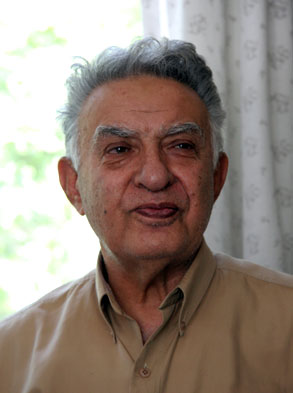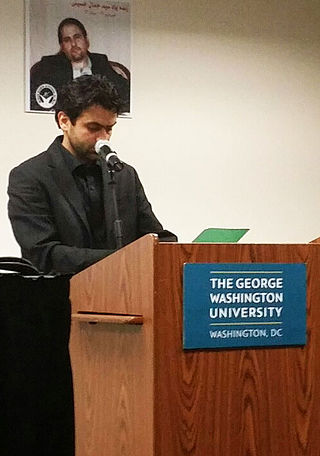Related Research Articles

Evin Prison is a prison located in the Evin neighborhood of Tehran, Iran. The prison has been the primary site for the housing of Iran's political prisoners since 1972, before and after the Iranian Revolution, in a purpose-built wing nicknamed "Evin University" due to the high number of students and intellectuals detained there. Evin Prison has been accused of committing "serious human rights abuses" against its political dissidents and critics of the government.

Ezzatollah Sahabi was an Iranian politician and journalist. He was a parliament member from 1980 to 1984.

The state of human rights in the Islamic Republic of Iran has been regarded as very poor. The United Nations General Assembly and the Human Rights Commission have condemned prior and ongoing abuses in Iran in published critiques and several resolutions. The government is criticized both for restrictions and punishments that follow the Islamic Republic's constitution and law, and for "extrajudicial" actions by state actors, such as the torture, rape, and killing of political prisoners, and the beatings and killings of dissidents and other civilians. Capital punishment in Iran remains a matter of international concern.
Baháʼís are persecuted in various countries, especially in Iran, where the Baháʼí Faith originated and where one of the largest Baháʼí populations in the world is located. The origins of the persecution stem from a variety of Baháʼí teachings which are inconsistent with traditional Islamic beliefs, including the finality of Muhammad's prophethood, and the placement of Baháʼís outside the Islamic religion. Thus, Baháʼís are seen as apostates from Islam.

In mid-1988, Ayatollah Khomeini of Iran ordered the execution of thousands of political prisoners. These executions happened all over Iran and lasted about five months, beginning on July 19. They took place in at least 32 cities across the country, and were carried out without any legal authority. Trials were not concerned with establishing guilt or innocence. Many prisoners were also tortured. Great care was taken to conceal the executions.
Ali Afshari is an Iranian activist who seeks reform in the Islamic Republic. He is a member of the Central Council of Office for Strengthening Unity and the Central Council of the Islamic Student Association at the Amirkabir University of Technology He served as secretary of the association for three years. He was a Reagan-Fascell Democracy Fellow at the National Endowment for Democracy.

Mehdi Khalaji is an Iranian-American writer, scholar of Islamic studies, political analyst and a former Shia cleric. He has been researching at The Washington Institute for Near East Policy since 2005, and is now a senior research fellow focusing on the politics of Iran and Shiite groups in the Middle East. He has frequently contributed to media outlets such as The Guardian, BBC, The Washington Post, and The New York Times.

From the Imperial Pahlavi dynasty, through the Islamic Revolution (1979), to the era of the Islamic Republic of Iran, government treatment of Iranian citizens' rights has been criticized by Iranians, international human rights activists, writers, and NGOs. While the monarchy under the rule of the shahs was widely attacked by most Western watchdog organizations for having an abysmal human rights record, the government of the Islamic Republic which succeeded it is considered still worse by many.

Masih Alinejad is an Iranian-American journalist, author, and women's rights activist. Alinejad works as a presenter/producer at Voice of America Persian News Network, a correspondent for Radio Farda, a frequent contributor for Manoto television, and a contributing editor for IranWire. Alinejad focuses on criticism of the status of human rights in Iran, especially women's rights. Time magazine named her among its 2023 honorees for Women of the Year.
Esha Momeni is an Iranian-American scholar and women's rights activist. She was a member of One Million Signatures campaign.
Adnan Hassanpour is an Iranian-Kurdish journalist who was sentenced to death in Iran in 2007 and reversed a year later. He was re-tried on the capital charges of espionage and working with outlawed parties. In September 2016 he was released, after almost 10 years in prison.

Majid Tavakoli is an Iranian student leader, human rights activist and political prisoner. He used to be a member of the Islamic Students' Association at Tehran's Amirkabir University of Technology, where he studied shipbuilding. He was arrested at least three times by the Iranian Ministry of Intelligence, during the student protests over the disputed Presidential Election of 2009. In response to allegations that he cross-dressed as a disguise to avoid arrest, a campaign protesting his imprisonment featured men posting photos of themselves wearing hijab.

Nasrin Sotoudeh is a human rights lawyer in Iran. She has represented imprisoned Iranian opposition activists and politicians following the disputed June 2009 Iranian presidential elections and prisoners sentenced to death for crimes committed when they were minors. Her clients have included journalist Isa Saharkhiz, Nobel Peace Prize laureate Shirin Ebadi, and Heshmat Tabarzadi. She has also represented women arrested for appearing in public without a hijab, which is a punishable offense in Iran. Nasrin Sotoudeh was the subject of Nasrin, a 2020 documentary filmed in secret in Iran about Sotoudeh's "ongoing battles for the rights of women, children and minorities." In 2021, she was named as of Time's 100 Most Influential People in the World. She was released on a medical furlough in July 2021.
The United Arab Emirates Five are five activists who were arrested in April 2011 on charges of breaking United Arab Emirates law of defamation by insulting heads of state, namely UAE president Khalifa bin Zayed Al Nahyan, vice president Mohammed bin Rashid Al Maktoum, and Abu Dhabi crown prince Mohammed bin Zayed Al Nahyan, through running an website that expressed anti-government views.

Keyvan Rafiee is an Iranian political activist. He is a former prisoner of conscience, and was arrested six times for his activities starting in 2003. He is one of the founders of Human Rights Activists in Iran (HRAI).
Arash Sadeghi is an Iranian activist and a political prisoner known best for his hunger strike as an act of protest against the detention of his wife without any judiciary proof or legal warrant. Sadeghi was a university student in Allameh Tabatabaei University in Tehran where he was expelled by the authorities due to his political activities.
Academic freedom in the Middle East is a contested and debated issue, which has caught regional and international attention. In the Middle East and North Africa (MENA) region, in general, the authoritarian regimes have all showed a certain degree of opposition to every sort of freedom, academic one not excluded, regardless of the type of regime basis they had. Freedom for academicians to inquiry, research, teach and communicate ideas or report facts without being threatened or persecuted or with the possibility of losing their position, being censored or repressed is threatened. What contributes to academic freedom violations is also that they are essential elements for the regimes to maintain their power and in addition to this issue, interstate and civil wars as well as internal disorders and external intervention can damage educational structures and institutions. Additionally, as far as the regime is concerned, a security or national threat can be a pretest for suffocate or suspend academic research and debate. Restrictions on academic freedom also regards the topics of research, which are under significant constraints, although these might be highly interesting and worth researching.
Ahmad Reza Djalali is an Iranian-Swedish disaster medicine doctor, lecturer, and researcher. He has worked in several universities in Europe, among which Karolinska University of Sweden, where he had also attended his PhD program, Università degli Studi del Piemonte Orientale (Italy), Vrije Universiteit Brussel (Belgium). He also cooperated with universities in Iran and is in contact with universities worldwide.
The Girls of Enghelab protests are protests against the compulsory hijab in Iran, part of the wider Iranian Democracy Movement. The protests were inspired by Vida Movahed, an Iranian woman known as the Girl of Enghelab Street, who stood in the crowd on a utility box on Enghelab Street in Tehran on 27 December 2017 during the 2017–2018 Iranian protests who tied a white headscarf, to a stick, and waved it to the crowd as a flag. She was arrested on that day and was released temporary on bail a month later, on 28 January 2018. Some people interpreted Movahed's action as being based on Masih Alinejad's call for White Wednesdays, a protest movement that the presenter at VOA Persian Television started in early 2017. Other women later re-enacted her protest and posted photos of their actions on social media. These women are described as the "Girls of Enghelab Street" and the "Girls of Revolution Street" in English sources. Some of the protesters however claim that they were not following Masih Alinejad's call. The protests intensified in 2022 due to the death of Mahsa Amini.
Javaid Rehman is a British-Pakistani legal scholar and Professor of Islamic Law and International Law at Brunel University London.
References
- ↑ "Arrest and detention of Dr. Mehdi Zakerian". September 12, 2008. Retrieved July 18, 2024.
- ↑ "About us". International Studies Journal.[ permanent dead link ]
- ↑ "International Studies Journal ( Our Team )". Archived from the original on 2012-01-17. Retrieved 2010-11-05.
- ↑ "Iranian scholar arrested". Radio Farda. 8 September 2008. Retrieved 18 July 2024.
- ↑ "Penn visiting scholar reportedly detained in Iran". The Philadelphia Inquirer. 6 September 2008. Retrieved 18 July 2024.
- ↑ "Iran: Fear of torture or ill treatment/ incommunicado detention: Dr Mehdi Zakerian (m)". Amnesty International. 19 September 2008. Retrieved 18 July 2024.
- ↑ "Iranian professor arrested before a visit to the US". Radio Farda. 19 September 2008. Retrieved 18 July 2024.
- ↑ "Iranian professor arrested before a visit to the US". Agence France Presse via Iran Focus. 6 April 2008. Retrieved 18 July 2024.
- ↑ "Search - Goat". Archived from the original on 2011-07-20. Retrieved 2010-11-05.
- ↑ "Penn Law and Human Rights Groups Seek Release of Iranian Scholar (Penn Law News & Stories)". Archived from the original on 2010-07-19. Retrieved 2010-11-05.